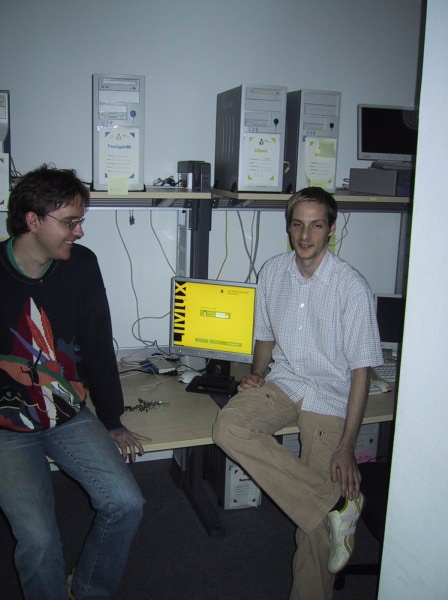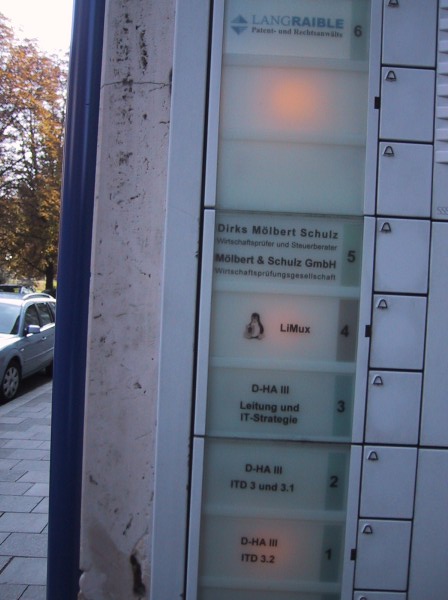 About
About
Steve's blog,
The Words of the Sledge
steve@einval.com
Subscribe
Subscribe to the RSS feed.
Links
Friends
Wednesday, 18 October 2006
LiMux - bringing Debian to Munich's local government
As promised yesterday in my report about the Munich BSP, I'd like to talk some more about LiMux, the project being run within the City of Munich to replace all of their desktop Windows systems with Linux. The team kindly offered us the use of their offices in central Munich as a base for the BSP last weekend, and on Sunday afternoon they gave us a demonstration and answered lots of our questions. The following is from my (known-faulty) memory...
Jan-Marek and Florian talked us through their setup. They're using FAI to automate installation of systems, along with LDAP to store lots of configuration information and GOsa as a user-friendly front-end to that configuration. They've integrated these to enable some very clever management features so that all aspects of the city-wide system can be maintained from one central point. As new machines are introduced onto the network, they can be configured into one class or another: simple desktop clients up to so-called "depot" servers, used as seeds for further clients. Individual user profiles can be tweaked, giving users access to new applications as they are needed. Shared resources like network storage and printers are set up automatically from the LDAP database. Access to USB storage devices can be controlled on a per-device, per-user basis for security.
That's quite an impressive feature list. Most of the work has been in configuration and systems work rather than custom packages on the clients themselves - the vast majority of the packages installed come straight from the standard Debian archive, with some backports (like a newer version of KDE). Building on top of standard packages means that they have access to a huge amount of Free Software without having to do all of the work themselves. A small team (10-ish at the moment, growing to 100 or so in the future) can effectively deploy and manage desktops and associated servers for a huge number of users - they're expecting to be supporting on the order of 30,000 systems 2 years from now.
The team have just recently made their first stable release and are starting to roll it out across the city, one department at a time. There are the familiar issues involved in the deployment, of course. For example, users don't want to help test pre-release versions to help nail bugs, but then complain loudly when they find bugs in the first release. And in such a large project to migrate from predominantly Windows (NT4!) desktops to KDE on Linux, a major part of the effort needed is in user training. There is quite a bit of support and custom work needed to convert people's MS Office macros over to working on top of OpenOffice. And there are still quite a number of users who will remain using Windows for specific applications that still don't have Linux equivalents yet. Apparently the "Wine Cellar" group will help on that front. *grin*
In terms of collaborating with Debian, the LiMux team are expecting to help in a few ways. As bug reports are filed against their applications (apparently very few so far), they'll be pushed upstream along with (hopefully) fixes for them. They will also be devoting some full-time developer effort to security work; it would be good for both sides if this effort can be shared.
It was quite striking to see Tux, the Linux penguin, as a visible logo in local government offices! The team have clearly made some excellent progress on this exciting project, and I'm sure that I can speak for all of Debian in wishing them the best of luck in the future. I'll be watching with interest...
02:05 :: # :: /debian/misc :: 16 comments
Comments
|
Re: LiMux - bringing Debian to Munich's local government superstoned wrote on Sun, 22 Oct 2006 10:46 |
|
@gheorghe: why debian-based? because it is well known as the most stable linux distribution... definitely more so than suse and of course ubuntu (which is based on the 'unstable' or development branch of debian). actually debian's unstable distribution is used a lot for other distributions (Linspire, Xandros, Ubuntu) because it is known to be as stable as most final releases of other Linux OS'es... Reply |
Your Comment


